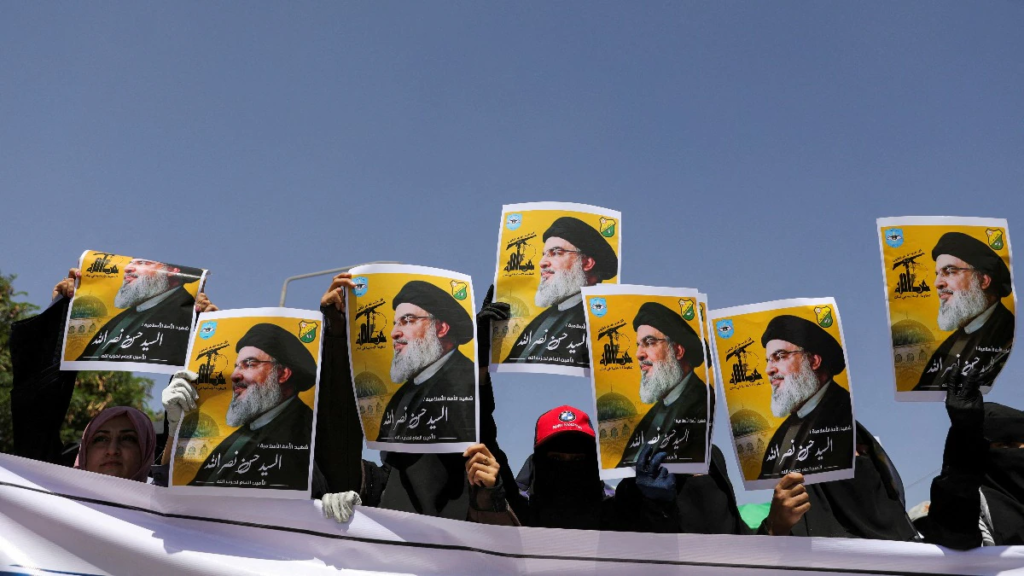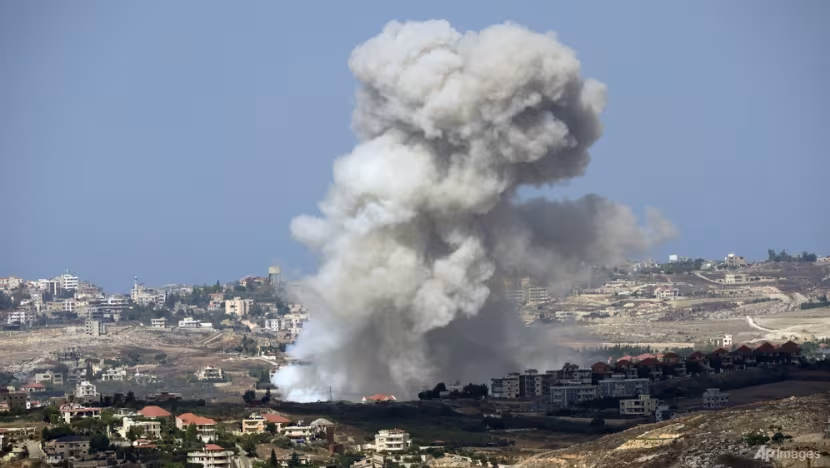Hezbollah, the powerful Shia militant group based in Lebanon, has publicly expressed support for efforts to reach a ceasefire with Israel for the first time. This marks a significant shift in their stance, as previously their position had been linked directly to the ongoing war between Israel and Hamas in Gaza.
On Tuesday, October 8, 2024, Hezbollah’s Deputy Secretary General, Naim Qassem, announced the group’s backing for political efforts led by Lebanese Parliament Speaker Nabih Berri, aimed at achieving a ceasefire in Lebanon.
This announcement comes amid escalating violence between Hezbollah and Israel, with Israeli forces ramping up their offensive against its positions in southern Lebanon.
Read : UN Mission in Lebanon Refuses to Leave Despite Israeli Request
The situation has become increasingly complex as both sides have been engaged in intense hostilities, further deepening the regional conflict that was sparked after Hamas’ initial attack on Israel in 2023. Despite Hezbollah’s endorsement of ceasefire efforts, the situation on the ground remains tense, with both sides continuing to exchange heavy fire.
Hezbollah’s Shift Towards Supporting a Ceasefire
It has long been a key player in Lebanon’s political and military landscape, wielding significant influence domestically and maintaining a deeply entrenched hostility toward Israel.
Since its formation in the 1980s, the group has positioned itself as a resistance force against Israeli occupation, and over the decades, its military capability has grown into a formidable force within the region. Hezbollah’s decision to express support for a ceasefire in Lebanon, therefore, marks a notable change in their approach to the current conflict.
In his statement on Tuesday, Naim Qassem emphasized the group’s backing for political efforts to achieve a ceasefire, a move spearheaded by Speaker Nabih Berri. Berri, who leads the Shia Amal party, has been at the forefront of ceasefire negotiations mediated by Western nations.
Qassem made it clear that once a ceasefire is firmly established, further diplomatic efforts would follow, and decisions would be made in collaboration with all relevant parties.

This public endorsement of a ceasefire is the first time militant group has not conditioned its cessation of hostilities on the outcome of the Gaza war. In previous statements, militant group had linked any ceasefire in Lebanon to a truce in Gaza, insisting that their attacks on Israel would only stop when Hamas and Israel reached a ceasefire agreement.
However, Qassem’s latest speech did not include Gaza as a precondition for a ceasefire, reflecting a significant shift in their stance.
Hezbollah’s involvement in the war began in October 2023, when they fired at Israeli forces in solidarity with Hamas after the Palestinian group launched an attack from Gaza. Since then, militant group has maintained a pattern of cross-border rocket attacks on northern Israel, while Israel has retaliated with airstrikes on Hezbollah targets in southern Lebanon.
Despite this ongoing conflict, the public declaration of support for a ceasefire signals that militant group may be seeking to de-escalate the violence within Lebanon, even as tensions remain high.
Israeli Offensive and Hezbollah’s Response
Despite Hezbollah’s nod toward political efforts to achieve a ceasefire, the situation on the ground remains volatile. Israel, which has been facing rocket attacks from Hezbollah, has ramped up its military offensive against the group in southern Lebanon. Over the past month, Israeli airstrikes have targeted Hezbollah strongholds, with over 120 targets hit in recent days.
These strikes have included attacks on rocket-launching sites, weapons depots, and command centers. In response, Hezbollah has continued to launch rockets into northern Israel, including a large barrage on Tuesday targeting the Israeli cities of Haifa and Kiryat Yam.
The Israeli Defense Forces (IDF) reported that many of the rockets fired by Hezbollah were intercepted by their missile defense systems, while others landed in open areas. However, at least two buildings in the cities of Kiryat Yam and Kiryat Motzkin were hit directly, leading to widespread damage.
These rocket attacks are part of an ongoing cycle of violence that has resulted in significant casualties and destruction on both sides. According to the Lebanese health ministry, more than 1,400 people have been killed in Lebanon since the escalation of fighting last month, while over 1.2 million people have been displaced by the conflict.
In addition to airstrikes, Israel has also expanded its limited ground operations into southwestern Lebanon, with small incursions targeting Hezbollah positions. The goal of these operations, according to the IDF, is to weaken Hezbollah’s military infrastructure and prevent further rocket attacks on Israeli civilians.

Israeli Prime Minister Benjamin Netanyahu has also made it clear that the Israeli government sees Hezbollah as a direct threat to its national security, and that military operations will continue until that threat is neutralized.
In a video message released on Tuesday, Netanyahu urged the people of Lebanon to rise against Hezbollah, accusing the group of dragging Lebanon into a destructive war.
He warned that if Hezbollah continued its attacks, Lebanon could face a situation similar to Gaza, where large-scale Israeli military operations have devastated infrastructure and caused widespread suffering.
Netanyahu’s rhetoric underscores the high stakes of the ongoing conflict and suggests that Israel is prepared to continue its offensive until Hezbollah is significantly weakened or a ceasefire is reached.
The Role of International Mediation and Future Prospects for a Ceasefire
As Hezbollah signals its openness to a ceasefire, international actors have stepped up their efforts to mediate a truce between the warring parties. The United States, France, and other Western nations have been involved in behind-the-scenes negotiations aimed at de-escalating the conflict and preventing it from spilling over into a wider regional war.
U.S. President Joe Biden and French President Emmanuel Macron, among others, have called for a temporary ceasefire in Lebanon to allow for humanitarian aid to reach civilians and to prevent further displacement.
Lebanese Foreign Minister Abdallah Bou Habib revealed last week that Hezbollah leader Hassan Nasrallah had agreed to a temporary ceasefire proposed by Western nations. However, Nasrallah’s assassination by Israeli forces shortly thereafter has thrown these diplomatic efforts into uncertainty.
The killing of Nasrallah, who had been the figurehead of Hezbollah for decades, marks a significant blow to the organization. In response, Hezbollah has vowed to continue its fight against Israel, and there are concerns that Nasrallah’s death could lead to further escalation rather than de-escalation.
Israel, for its part, has been reluctant to engage in formal ceasefire talks, insisting that Hezbollah’s conflict with Israel must be separated from the war in Gaza. Israeli officials have expressed skepticism about the sincerity of Hezbollah’s ceasefire offer, with Israeli Ambassador to the U.K., Tzipi Hotovely, calling claims of a temporary truce “ridiculous.”
The Israeli government has instead focused on limiting Hezbollah’s military capabilities through targeted operations and diplomatic pressure on Lebanon to rein in the group.
The Biden administration, while involved in ceasefire negotiations, has reportedly shifted its focus to managing and limiting Israeli operations in Lebanon rather than actively trying to broker a truce. U.S. officials have expressed concerns that a prolonged conflict in Lebanon could destabilize the region further and draw in other actors, such as Iran, which has close ties to Hezbollah.
The risk of a broader regional conflict looms large, and international efforts are increasingly focused on preventing the war from spiraling out of control.

Despite the challenges, there remains a glimmer of hope for a ceasefire in Lebanon. Hezbollah’s endorsement of Speaker Nabih Berri’s efforts represents a significant opening for diplomacy. If Berri, with the backing of Western nations, can broker a truce, it could lead to a de-escalation of hostilities in Lebanon, even if the war in Gaza continues.
However, given the complexity of the situation and the entrenched positions on both sides, achieving a lasting ceasefire will require sustained diplomatic pressure and careful negotiation.
Hezbollah’s public endorsement of ceasefire efforts in Lebanon represents a significant development in the ongoing conflict with Israel. While the group has continued its military operations against Israeli forces, the shift in their rhetoric suggests that there may be room for diplomatic efforts to take hold.
However, the situation on the ground remains precarious, with Israeli airstrikes and Hezbollah rocket attacks continuing to cause devastation and loss of life. As international actors work behind the scenes to mediate a ceasefire, the future of the conflict remains uncertain.
Hezbollah’s willingness to engage in ceasefire talks, combined with Israeli military pressure and international mediation, presents a complex but potentially hopeful path forward. Whether a truce can be achieved in Lebanon remains to be seen, but the stakes are high for both Lebanon and Israel, as well as the broader region.

